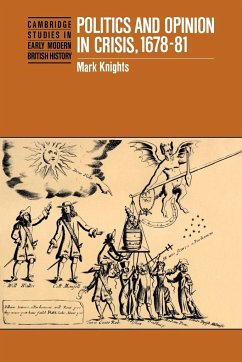The aftermath of the Popish Plot and the subsequent succession crisis of the years 1678 to 1681 are the context for this new study. It asks two key questions: Was there an exclusion crisis? and, Did these years witness the birth of modern political parties? Through a detailed analysis of Parliament, the court and the country, the author argues that the unrest was not simply due to a centrally organised party machine based around the single issue of exclusion, but was a broad-based controversy about the succession, fears of popery and arbitrary government which produced ideological polarisation and political sophistication. Part I examines central politics to explore the succession crisis within the context of the court and an emergent fluid but partisan political structure. Part II explores public opinion in the country as a whole, and argues that propaganda, electioneering, religious conflict and petitions and addresses committed men to organised networks of belief, but also ensured a struggle about the representation of the will of the people.
Hinweis: Dieser Artikel kann nur an eine deutsche Lieferadresse ausgeliefert werden.
Hinweis: Dieser Artikel kann nur an eine deutsche Lieferadresse ausgeliefert werden.





![The Gibbet of Regina [microform]: the Truth About Riel: Sir John A. Macdonald and His Cabinet Before Public Opinion The Gibbet of Regina [microform]: the Truth About Riel: Sir John A. Macdonald and His Cabinet Before Public Opinion](https://bilder.buecher.de/produkte/65/65628/65628295m.jpg)


